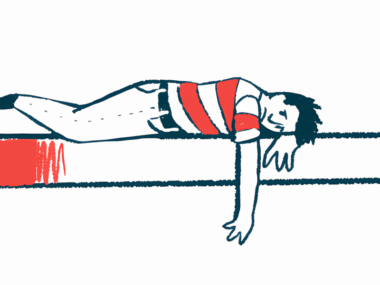Managing hemophilia and, through conversation, mental health
Talk is essential in planning a career that considers all kinds of health
Written by |

In 2000, actor Tom Hanks starred in the movie “Cast Away.” His character, Chuck Noland, traveled the world as a systems analyst for FedEx, and his plane crashed in the South Pacific. He was on a deserted island, and his only connections with the world were the FedEx packages that washed ashore.
One of the packages contained a volleyball. With a bloodied hand, he threw the volleyball in a moment of frustration. The imprint left a crude image of a face when he picked it up. Noland named it Wilson. Wilson became Noland’s lifeline, his companion. This relationship was Noland’s attempt to remain tethered to humanity. The scorching sun and hunger were not his enemies as much as solitude was.
This movie came to mind during a recent conversation with my youngest son, Caeleb. He’s completing his freshman year in college and has found his passion for digital arts and editing. Caeleb talked excitedly about his end-of-term project, his eyes lighting up in a way I haven’t seen in a long time.
Our conversation became serious as Caeleb, who has hemophilia, expressed his worry about having a job, but added, “I think it’s possible to work remotely in the job I want. That way I can still work and not worry about missing because of pain.”
I nodded. He wasn’t wrong. His chosen field does lend itself to remote opportunities. His self-awareness and forward thinking impressed me, and I was grateful he was already considering how his work in digital arts could fit his particular health challenges. But as I listened, a different kind of concern began to rise in me — not whether he could do the work, but whether he could handle the emotional cost of working alone.
For 13 years, I worked remotely. Being home, surrounded by quiet day in and day out, is a great way to complete work. However, the absence of daily interaction can blur the line between solitude and isolation. In the solitude, my depression often worsened.
Preparing to possibly work in solitude
With a chronic condition like hemophilia, having flexibility and independence in work is ideal. It allows people to remain professionally active without compromising their health. And as Caeleb has lived with the long-lasting effects of joint bleeds, managing chronic pain is difficult for him.
Caeleb is a strong, creative young man who is resilient beyond his years. But he’s also experienced the weight of depression and loneliness. I know my son can handle working remotely, but the lack of interaction with others concerns me.
I hope Caeleb finds creative ways to build a community as he continues to attend college. Having that resource through online collaborations, virtual meetups, or consistent psychological support will help him maintain good mental health.
Yes, I hate that my son has to think about limitations when he’s just beginning his adult life. But I’m also incredibly proud — proud of his talent, his heart, his honesty, and his forward-thinking. He’s already navigating life with wisdom beyond his years.
I encouraged Caeleb and told him my concerns, about working alone and the importance of connection. We continued to talk about mental health, and knowing he was open to the conversation made my mama’s heart swell with happiness.
May is Mental Health Awareness Month. It’s designed to help raise public awareness about mental health issues, reduce stigma, and promote mental wellness. It emphasizes education about mental illness, research, and treatment and encourages getting help. What was once a taboo topic of discussion is now more accepted.
Share your mental health struggles with someone you trust. Celebrate your victories as you manage your condition. And most of all, keep the conversation going. When struggling, reach out to someone.
Be a supporter and offer love and compassion.
And if you don’t understand the mental health struggle, just listen.
Note: Hemophilia News Today is strictly a news and information website about the disease. It does not provide medical advice, diagnosis, or treatment. This content is not intended to be a substitute for professional medical advice, diagnosis, or treatment. Always seek the advice of your physician or another qualified health provider with any questions you may have regarding a medical condition. Never disregard professional medical advice or delay in seeking it because of something you have read on this website. The opinions expressed in this column are not those of Hemophilia News Today or its parent company, Bionews, and are intended to spark discussion about issues pertaining to hemophilia.




Leave a comment
Fill in the required fields to post. Your email address will not be published.